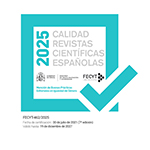Digital humanities and literary translation: inclusiveness and transdisciplinarity in the case of the translation of Chinese literature into Spanish
Abstract
This text analyzes the advantages of digital humanities for literary translators from a trans-disciplinary perspective, especially in the case of Chinese literature and its translation into Spanish, as digital tools are essential for cultural diversification and language learning. Thanks to numerous digital resources that reduce costs and reproduce information on a large scale, by putting in contact seemingly distant cultures we can find common aspects that generate acceptance and inclusiveness in a wider geographical reach. Digital humanities have generated not only a growing interest in foreign literature that is not part of the Western canon, but have also established new methodologies for literary translation.
Downloads
Article download
License
In order to support the global exchange of knowledge, the journal Dicenda. Cuadernos de Filología Hispánica is allowing unrestricted access to its content as from its publication in this electronic edition, and as such it is an open-access journal. The originals published in this journal are the property of the Complutense University of Madrid and any reproduction thereof in full or in part must cite the source. All content is distributed under a Creative Commons Attribution 4.0 use and distribution licence (CC BY 4.0). This circumstance must be expressly stated in these terms where necessary. You can view the summary and the complete legal text of the licence.









